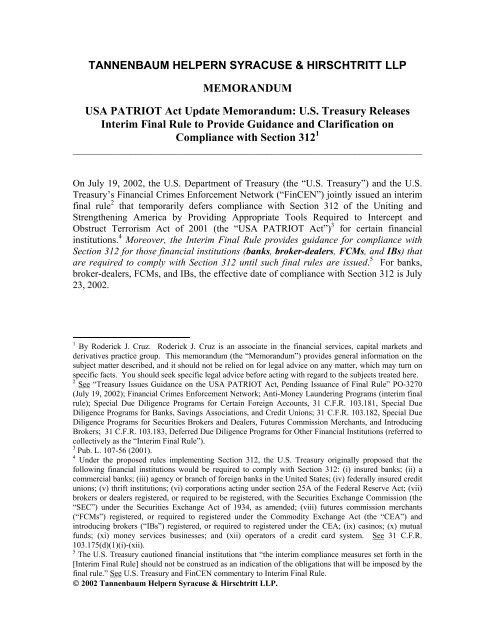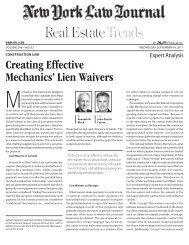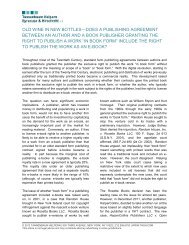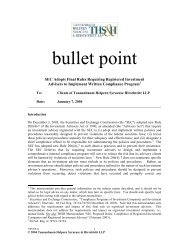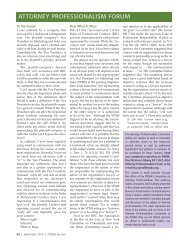USA PATRIOT Act Update Memorandum: U.S. Treasury Releases ...
USA PATRIOT Act Update Memorandum: U.S. Treasury Releases ...
USA PATRIOT Act Update Memorandum: U.S. Treasury Releases ...
You also want an ePaper? Increase the reach of your titles
YUMPU automatically turns print PDFs into web optimized ePapers that Google loves.
TANNENBAUM HELPERN SYRACUSE & HIRSCHTRITT LLP<br />
MEMORANDUM<br />
<strong>USA</strong> <strong>PATRIOT</strong> <strong>Act</strong> <strong>Update</strong> <strong>Memorandum</strong>: U.S. <strong>Treasury</strong> <strong>Releases</strong><br />
Interim Final Rule to Provide Guidance and Clarification on<br />
Compliance with Section 312 1<br />
________________________________________________________________________<br />
On July 19, 2002, the U.S. Department of <strong>Treasury</strong> (the “U.S. <strong>Treasury</strong>”) and the U.S.<br />
<strong>Treasury</strong>’s Financial Crimes Enforcement Network (“FinCEN”) jointly issued an interim<br />
final rule 2 that temporarily defers compliance with Section 312 of the Uniting and<br />
Strengthening America by Providing Appropriate Tools Required to Intercept and<br />
Obstruct Terrorism <strong>Act</strong> of 2001 (the “<strong>USA</strong> <strong>PATRIOT</strong> <strong>Act</strong>”) 3 for certain financial<br />
institutions. 4 Moreover, the Interim Final Rule provides guidance for compliance with<br />
Section 312 for those financial institutions (banks, broker-dealers, FCMs, and IBs) that<br />
are required to comply with Section 312 until such final rules are issued. 5 For banks,<br />
broker-dealers, FCMs, and IBs, the effective date of compliance with Section 312 is July<br />
23, 2002.<br />
1 By Roderick J. Cruz. Roderick J. Cruz is an associate in the financial services, capital markets and<br />
derivatives practice group. This memorandum (the “<strong>Memorandum</strong>”) provides general information on the<br />
subject matter described, and it should not be relied on for legal advice on any matter, which may turn on<br />
specific facts. You should seek specific legal advice before acting with regard to the subjects treated here.<br />
2 See “<strong>Treasury</strong> Issues Guidance on the <strong>USA</strong> <strong>PATRIOT</strong> <strong>Act</strong>, Pending Issuance of Final Rule” PO-3270<br />
(July 19, 2002); Financial Crimes Enforcement Network; Anti-Money Laundering Programs (interim final<br />
rule); Special Due Diligence Programs for Certain Foreign Accounts, 31 C.F.R. 103.181, Special Due<br />
Diligence Programs for Banks, Savings Associations, and Credit Unions; 31 C.F.R. 103.182, Special Due<br />
Diligence Programs for Securities Brokers and Dealers, Futures Commission Merchants, and Introducing<br />
Brokers; 31 C.F.R. 103.183, Deferred Due Diligence Programs for Other Financial Institutions (referred to<br />
collectively as the “Interim Final Rule”).<br />
3 Pub. L. 107-56 (2001).<br />
4 Under the proposed rules implementing Section 312, the U.S. <strong>Treasury</strong> originally proposed that the<br />
following financial institutions would be required to comply with Section 312: (i) insured banks; (ii) a<br />
commercial banks; (iii) agency or branch of foreign banks in the United States; (iv) federally insured credit<br />
unions; (v) thrift institutions; (vi) corporations acting under section 25A of the Federal Reserve <strong>Act</strong>; (vii)<br />
brokers or dealers registered, or required to be registered, with the Securities Exchange Commission (the<br />
“SEC”) under the Securities Exchange <strong>Act</strong> of 1934, as amended; (viii) futures commission merchants<br />
(“FCMs”) registered, or required to registered under the Commodity Exchange <strong>Act</strong> (the “CEA”) and<br />
introducing brokers (“IBs”) registered, or required to registered under the CEA; (ix) casinos; (x) mutual<br />
funds; (xi) money services businesses; and (xii) operators of a credit card system. See 31 C.F.R.<br />
103.175(d)(1)(i)-(xii).<br />
5 The U.S. <strong>Treasury</strong> cautioned financial institutions that “the interim compliance measures set forth in the<br />
[Interim Final Rule] should not be construed as an indication of the obligations that will be imposed by the<br />
final rule.” See U.S. <strong>Treasury</strong> and FinCEN commentary to Interim Final Rule.<br />
© 2002 Tannenbaum Helpern Syracuse & Hirschtritt LLP.
1. General Requirements Under Section 312 as Originally Proposed<br />
As proposed, Section 312 would require U.S. financial institutions to establish due<br />
diligence policies, procedures and controls reasonably designed to detect and report<br />
money laundering through correspondent accounts 6 and private banking accounts 7 that<br />
U.S. financial institutions establish or maintain for foreign financial institutions and non-<br />
U.S. persons, respectively. 8 In instances when a foreign customer poses a high risk, a<br />
U.S. financial institution would be required to conduct enhanced due diligence. 9<br />
2. Who Must Now Comply with Section 312<br />
Originally, fourteen categories of U.S. financial institutions would have been required to<br />
comply with rules implementing Section 312 of the <strong>USA</strong> <strong>PATRIOT</strong> <strong>Act</strong>. 10 Under the<br />
Interim Final Rule implementing Section 312, the U.S. <strong>Treasury</strong> has designated the<br />
following four categories of financial institutions as having to comply with Section 312:<br />
(i) Banks 11 ;<br />
(ii) Securities brokers and dealers (registered or required to register with the<br />
SEC);<br />
(iii) FCMs (registered or required to register with the CFTC); and<br />
(iv) IBs (registered or required to register with the CFTC). 12<br />
6 “Correspondent account” is defined to mean an “account established to receive deposits from, make<br />
payments on behalf of a foreign financial institution, or handle other financial transactions related to such<br />
institution.” 31 C.F.R. 103.175(c)(1).<br />
7 “Private banking account” is defined to mean an account that (i) requires a minimum aggregate amount of<br />
funds or other assets of not less than U.S.$ 1 million; (ii) is established on behalf of or for the benefit of<br />
one or more individuals who have a direct or beneficial ownership interest in the account; and (iii) is<br />
assigned to or is administered or managed by the covered financial institution. 31 C.F.R. 103.175(n).<br />
8 See THSH <strong>USA</strong> <strong>PATRIOT</strong> <strong>Act</strong> <strong>Update</strong> <strong>Memorandum</strong>: Proposed Regulation to Implement Section 312;<br />
Best Practices Identified by the SEC (discussing the due diligence to conduct with respect to correspondent<br />
accounts and private banking accounts, respectively).<br />
9 See e.g. 31 C.F.R. 103.176(b)-(c) (enhanced due diligence for foreign banks); 31 C.F.R. 103.178(c)<br />
(enhanced due diligence for senior foreign political figures).<br />
10 See supra note 4.<br />
11 The term “banks” includes an insured bank (as defined in section 3(h) of the Federal Deposit Insurance<br />
<strong>Act</strong> (12 U.S.C. 1813(h)); a commercial bank; an agency or branch of a foreign bank in the United States; a<br />
federally insured credit union; a thrift institution; and a corporation acting under section 25A of the Federal<br />
Reserve <strong>Act</strong> (12 U.S.C. 611 et seq). See U.S. <strong>Treasury</strong> and FinCEN commentary to Interim Final Rule.<br />
12 See U.S. <strong>Treasury</strong> and FinCEN commentary to Interim Final Rule. Accordingly, the following financial<br />
institutions that were originally required to implement due diligence programs pursuant to Section 312 of<br />
the <strong>USA</strong> <strong>PATRIOT</strong> <strong>Act</strong> are now deferred from compliance: casinos, mutual funds, money services<br />
businesses, and operators of a credit card system. See 31 C.F.R. 103.183(a); 31 C.F.R. 103.175(d)(1).<br />
Furthermore, the deferral from compliance with Section 312 continue to apply to: dealers in precious<br />
metals, stones or jewels; pawnbrokers; loan or finance companies; travel agencies; telegraph companies;<br />
sellers of vehicles, including automobiles, airplanes, and boats; persons involved in real estate closings and<br />
settlements’ private bankers; insurance companies; commodity pool operators (“CPOs”); commodity<br />
trading advisors (“CTAs”); and investment companies other than mutual funds. See 31 C.F.R. 103.183(a);<br />
U.S. <strong>Treasury</strong> and FinCEN commentary to Interim Final Rule, note 7.<br />
[668425-2]<br />
2
3. Extent of Compliance under Section 312 – What is Required For Now<br />
A. Banks<br />
Banks must conduct due diligence on both correspondence accounts and private banking<br />
accounts established, maintained, administered, or managed in the United States. 13<br />
However, rather than list specific procedures for banks to implement, the U.S. <strong>Treasury</strong><br />
and FinCEN currently require banks to adopt “best practices” standards discussed in<br />
releases issued by industry associations. Therefore, for correspondent accounts, in the<br />
interim, a bank should adopt the “Guidelines for Counter Money Laundering Policies and<br />
Procedures in Correspondent Banking,” issued by the New York Clearing House<br />
Association, L.L.C. and “Customer Due Diligence for Banks,” issued by the Basel<br />
Committee on Banking Supervision. 14 For private banking accounts, in the interim, a<br />
bank should adopt the “Private Banking <strong>Act</strong>ivities” issued by the U.S. Federal Reserve,<br />
the “Guidance on Enhanced Scrutiny for Transactions that May Involve the Proceeds of<br />
Foreign Official Corruption” issued by the U.S. Federal Reserve, and the “Global Anti-<br />
Money Laundering Guidelines for Private Banking: Wolfsberg AML Principles” issued<br />
by the Wolfsberg Group. 15<br />
B. Broker-dealers, FCMs, and IBs<br />
Broker-dealers, FCMs, and IBs are required to conduct due diligence on only private<br />
banking accounts. 16 However, rather than list specific procedures for broker-dealers,<br />
FCMs and IBs to implement, the U.S. <strong>Treasury</strong> and FinCEN currently require brokerdealers,<br />
FCMs and IBs to adopt “best practices” standards for private banking accounts<br />
discussed in releases issued by industry associations. Therefore, for private banking<br />
accounts, a broker-dealer, FCM or IB likewise should adopt the “Private Banking<br />
<strong>Act</strong>ivities” issued by the U.S. Federal Reserve, the “Guidance on Enhanced Scrutiny for<br />
Transactions that May Involve the Proceeds of Foreign Official Corruption” issued by the<br />
13 See 31 CFR 103.181.<br />
14 New York Clearing House Association, L.L.C., “Guidelines for Counter Money Laundering Policies and<br />
Procedures in Correspondent Banking” (March 2002) available at and the Basel<br />
Committee on Banking Supervision, “Customer Due Diligence for Banks” (October 2001) available at<br />
. See U.S. <strong>Treasury</strong> and FinCEN commentary to Interim Final Rule, note 8.<br />
15 Federal Reserve (SR 97-19 (SUP)), “Private Banking <strong>Act</strong>ivities” (June 30, 1997) available at<br />
, Federal Reserve (SR 01-03<br />
SUP)), “Guidance on Enhanced Scrutiny for Transactions that May Involve the Proceeds of Foreign<br />
Official Corruption” (January 16, 2001) available at<br />
, and Wolfsberg Group,<br />
“Global Anti-Money Laundering Guidelines for Private Banking: Wolfsberg AML Principles” (1 st<br />
Revision May 2002) available at . See U.S. <strong>Treasury</strong> and FinCEN<br />
commentary to Interim Final Rule, note 11.<br />
16 See 31 CFR 103.182. For broker-dealers, FCMs, and IBs, the U.S. <strong>Treasury</strong> and FinCEN has exercised<br />
its authority to temporarily defer the application of all other requirements under Section 312. See 31 CFR<br />
103.182(b); U.S. <strong>Treasury</strong> and FinCEN commentary to Interim Final Rule.<br />
[668425-2]<br />
3
U.S. Federal Reserve, and the “Global Anti-Money Laundering Guidelines for Private<br />
Banking: Wolfsberg AML Principles” issued by the Wolfsberg Group. 17<br />
C. Banks, Broker-Dealers, FCMs, and IBs: Evidencing a Reasonable Due Diligence<br />
Policy and Compliance with Section 312<br />
The U.S. <strong>Treasury</strong> stated that “in the interim, a reasonable due diligence policy, in<br />
<strong>Treasury</strong>’s view, is one that comports with existing best practices standards.” 18<br />
Moreover, by adopting existing best practices standards, it “evidences good faith efforts”<br />
of compliance. 19 It appears though that the U.S. <strong>Treasury</strong> expects banks, broker-dealers,<br />
FCMs, and IBs to adopt existing best practice standards in a wholesale fashion based on<br />
the U.S. <strong>Treasury</strong>’s comment that a financial institution should have a justification for<br />
not adopting a particular best practice or standard. 20 As such, banks, broker-dealers,<br />
FCMs, and IBs should consider adopting best practices standards in their entirety as a<br />
means of demonstrating that it has implemented a reasonable due diligence policy until<br />
final rules are issued.<br />
Furthermore, even though there is no specific guidance as to the due diligence measures<br />
to exercise when screening a non-U.S. person or a non-U.S. financial institution, the U.S.<br />
<strong>Treasury</strong> expects banks, broker-dealers, FCMs, and IBs to accord priority to conducting<br />
due diligence on high risk customers. 21 In particular, the U.S. <strong>Treasury</strong> expects banks,<br />
broker-dealers, FCMs, and IBs to conduct enhanced due diligence on those high risk<br />
customers seeking to open on or after July 23, 2002. 22 By focusing its efforts on non-<br />
U.S. persons/entities that pose a high risk of money laundering, a bank’s, broker-dealer’s,<br />
FCM’s, and IB’s due diligence program will be deemed to be reasonable in the U.S.<br />
<strong>Treasury</strong>’s view. 23<br />
17 Federal Reserve (SR 97-19 (SUP)), “Private Banking <strong>Act</strong>ivities” (June 30, 1997) available at<br />
, Federal Reserve (SR 01-03<br />
SUP)), “Guidance on Enhanced Scrutiny for Transactions that May Involve the Proceeds of Foreign<br />
Official Corruption” (January 16, 2001) available at<br />
, and Wolfsberg Group,<br />
“Global Anti-Money Laundering Guidelines for Private Banking: Wolfsberg AML Principles” (1 st<br />
Revision May 2002) available at . See U.S. <strong>Treasury</strong> and FinCEN<br />
commentary to Interim Final Rule, note 11.<br />
18 See U.S. <strong>Treasury</strong> and FinCEN commentary to Interim Final Rule.<br />
19 See U.S. <strong>Treasury</strong> and FinCEN commentary to Interim Final Rule.<br />
20 “A due diligence program that does not adopt all of the best practices and standards described in industry<br />
and other available guidance also could be considered reasonable if there is a justifiable basis for not<br />
adopting a particular best practice or standard, based on the particular type of accounts held by he<br />
institution.” See U.S. <strong>Treasury</strong> and FinCEN commentary to Interim Final Rule, note 8. See also U.S.<br />
<strong>Treasury</strong> and FinCEN commentary to Interim Final Rule, note 11.<br />
21 See U.S. <strong>Treasury</strong> and FinCEN commentary to Interim Final Rule.<br />
22 See U.S. <strong>Treasury</strong> and FinCEN commentary to Interim Final Rule.<br />
23 “In the interim period before the issuance of a final rule, a due diligence program under section<br />
5318(i)(1) will be reasonable in <strong>Treasury</strong>’s view if it focuses compliance efforts on the correspondent<br />
accounts [and private banking accounts] that pose a high risk of money laundering based on an overall<br />
assessment of the money laundering risk…” See U.S. <strong>Treasury</strong> and FinCEN commentary to Interim Final<br />
Rule.<br />
[668425-2]<br />
4
4. Effective Date of Compliance<br />
For banks, broker-dealers, FCMs, and IBs, the effective date of compliance with Section<br />
312 of the <strong>USA</strong> <strong>PATRIOT</strong> <strong>Act</strong> is July 23, 2002, regardless of whether the U.S. <strong>Treasury</strong><br />
has issued final rules implementing Section 312. 24 Moreover, application of the due<br />
diligence measures prescribed in Section 312 applies regardless of when a correspondent<br />
account or a private banking account was opened. 25<br />
The U.S. <strong>Treasury</strong> anticipates issuing a final rule implementing Section 312 no later than<br />
October 25, 2002. 26<br />
5. Significance of the Interim Final Rule for Section 312<br />
The significance of this release is that the U.S. <strong>Treasury</strong> recognizes the complexity of<br />
implementing Section 312 of the <strong>USA</strong> <strong>PATRIOT</strong> <strong>Act</strong> and therefore has adopted a more<br />
studied approach towards compliance. A strict application of the proposed rules would<br />
have been unrealistic and counterproductive in light of the unique business practices of<br />
each financial industry. 27 As such, the U.S. <strong>Treasury</strong> acknowledges the need for further<br />
study as to how each industry should comply with Section 312. 28<br />
Furthermore, the Interim Final Rule implementing Section 312 is significant because it<br />
demonstrates that the U.S. <strong>Treasury</strong> is being responsive to comments and concerns from<br />
the financial services industry. 29 A primary concern that the financial industry has<br />
expressed to the U.S. <strong>Treasury</strong> is that neither Title III of the <strong>USA</strong> <strong>PATRIOT</strong> <strong>Act</strong> nor the<br />
proposed rule implementing Section 312 defined key terms that establish the parameters<br />
of compliance with Section 312 for U.S. financial institutions. 30 Even if certain terms are<br />
defined, the criticism is that such defined terms are “overly broad and difficult to<br />
implement.” 31 In response to these concerns and difficulties, the U.S. <strong>Treasury</strong> has taken<br />
the position that additional time “is necessary and appropriate” to consider the definitions<br />
and the text of the proposed rule in light of comments received to determine whether the<br />
terms used in Section 312 should be further defined with respect to each financial<br />
institution. 32<br />
24 See U.S. <strong>Treasury</strong> and FinCEN commentary to Interim Final Rule.<br />
25 See U.S. <strong>Treasury</strong> and FinCEN commentary to Interim Final Rule. See also THSH <strong>USA</strong> <strong>PATRIOT</strong> <strong>Act</strong><br />
<strong>Update</strong> <strong>Memorandum</strong>: Proposed Regulation to Implement Section 312; Best Practices Identified by the<br />
SEC (discussing retroactive effect of Section 312).<br />
26 See U.S. <strong>Treasury</strong> and FinCEN commentary to Interim Final Rule.<br />
27 See U.S. <strong>Treasury</strong> and FinCEN commentary to Interim Final Rule: “Were <strong>Treasury</strong> to require strict<br />
compliance with the proposed rule, not only would it undermine the administrative process, but also it<br />
might require financial institutions to incur substantial costs comply with provisions of the proposed rule<br />
that may be altered or eliminated.”<br />
28 See U.S. <strong>Treasury</strong> and FinCEN commentary to Interim Final Rule.<br />
29 See U.S. <strong>Treasury</strong> and FinCEN commentary to Interim Final Rule.<br />
30 See U.S. <strong>Treasury</strong> and FinCEN commentary to Interim Final Rule.<br />
31 See U.S. <strong>Treasury</strong> and FinCEN commentary to Interim Final Rule. In its commentary, the U.S. <strong>Treasury</strong><br />
and FinCEN noted that commenters consistently criticized the definitions of “correspondent account,”<br />
“covered financial institution,” and “foreign financial institution” as being overly broad.<br />
32 See U.S. <strong>Treasury</strong> and FinCEN commentary to Interim Final Rule.<br />
[668425-2]<br />
5
The Interim Final Rule and its commentary indicate that the application of the antimoney<br />
laundering rules are not likely to be uniform but instead are likely to be tailored to<br />
each industry. As such, the hedge fund industry should view this release as an<br />
encouraging sign that the U.S. <strong>Treasury</strong> is willing to listen to the concerns of financial<br />
institutions. Therefore, the hedge fund industry should be pro-active when proposed rules<br />
for hedge funds are released for comment and collaborate with the U.S. <strong>Treasury</strong> on how<br />
anti-money laundering should be accomplished in the industry.<br />
* * * * * * *<br />
If you have any questions or comments regarding compliance with the <strong>USA</strong> <strong>PATRIOT</strong><br />
<strong>Act</strong> and about the U.S. <strong>Treasury</strong>’s press release and the accompanying Interim Final Rule<br />
implementing Section 312 of the <strong>USA</strong> <strong>PATRIOT</strong> <strong>Act</strong>, please feel free to contact Michael<br />
G. Tannenbaum at (212) 508-6701, Ricardo W. Davidovich at (212) 508-6710 or<br />
Roderick J. Cruz at (212) 702-3149.<br />
July 30, 2002<br />
[668425-2]<br />
6


